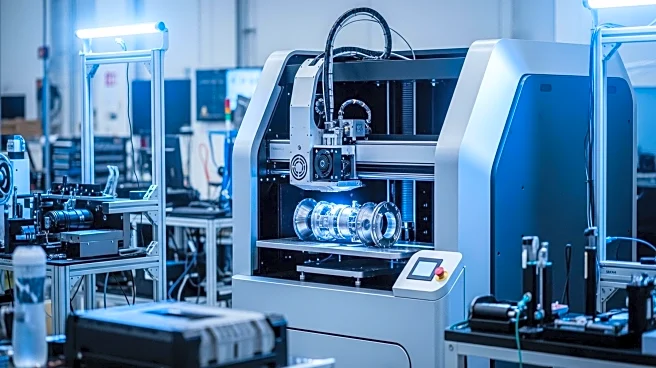What's Happening?
Collins Aerospace is participating in a significant aerospace 3D printing initiative backed by the UK government, known as Project STRATA. This project, led by Honeywell, is supported by a £14.1 million investment aimed at enhancing the UK's aircraft manufacturing supply chain. The initiative focuses on developing five innovative components for aircraft Environmental Control Systems (ECS) and Cabin Pressure Control Systems (CPCS). These systems are crucial for managing the cabin environment and ensuring passenger safety and comfort. The project also aims to advance thermal management technology for next-generation aircraft, which is expected to reduce energy consumption for heating and cooling, as well as fuel usage. The consortium involved in Project STRATA includes industry leaders, small and medium-sized enterprises, and academic institutions, all working together to leverage AI and additive manufacturing technologies.
Why It's Important?
The involvement of Collins Aerospace in Project STRATA highlights the growing importance of 3D printing in the aerospace industry. This initiative is expected to lead to more efficient aircraft components, reduced CO2 emissions, and a strengthened supply chain. By integrating AI-driven modeling and simulation, the project aims to accelerate innovation cycles and address supply chain challenges. The development of additively manufactured aerospace parts could significantly lower production costs and improve the sustainability of aircraft manufacturing. This aligns with broader industry goals of achieving net-zero emissions and enhancing environmental sustainability. The project's success could set a precedent for future aerospace manufacturing practices, benefiting manufacturers, operators, and passengers alike.
What's Next?
As Project STRATA progresses, the consortium will continue to explore the potential of AI and additive manufacturing in aerospace. The development of the five new components will be closely monitored, with potential implications for the global aerospace industry. Stakeholders, including government bodies and industry leaders, will likely assess the project's outcomes to determine its impact on future aerospace policies and practices. The initiative may also influence similar projects in other countries, as the aerospace industry seeks to adopt more sustainable and efficient manufacturing methods.
Beyond the Headlines
The ethical and environmental implications of Project STRATA are significant. By focusing on reducing CO2 emissions and improving energy efficiency, the project addresses critical environmental challenges facing the aerospace industry. Additionally, the collaboration between industry leaders and academic institutions highlights the importance of cross-sector partnerships in driving innovation. The project's success could lead to a shift in how aerospace components are designed and manufactured, with long-term benefits for the environment and the economy.










